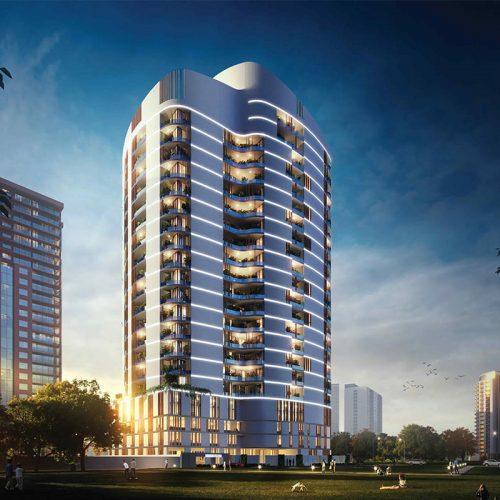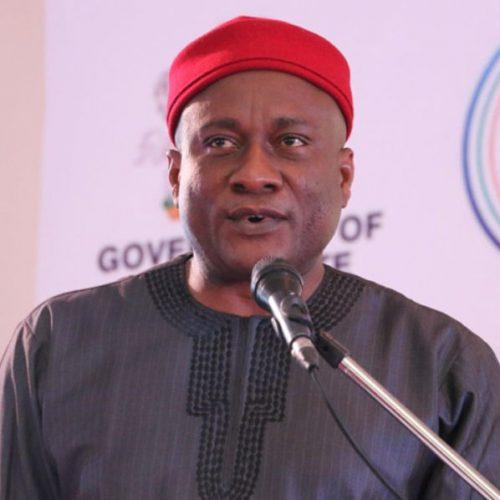As a decolonisation movement sweeps across Europe, there are efforts to return art looted by British soldiers in 1897.
![From Germany to Ireland, a Fresh Push to Return the Benin Bronzes 1 A view of the Benin bronze depicting the Oba of Benin is seen at The Sir Duncan Rice Library, the University of Aberdeen, Scotland [University of Aberdeen/Handout via Reuters]](https://www.aljazeera.com/wp-content/uploads/2021/04/2021-03-25T060618Z_272202382_RC26IM9XVBSZ_RTRMADP_3_GLOBAL-RACE-NIGERIA-BRONZES.jpg?resize=770%2C513)
The story of the Benin bronzes is one Timothy Awoyemi, a British-Nigerian police officer, knows well.
Like all schoolchildren in Nigeria, he was taught of the murderous 1897 raid when British soldiers plundered Benin City, stealing a priceless array of metal sculptures.Keep reading
So, unlike his United Kingdom-educated colleague Steve Dunstone, Awoyemi was not entirely puzzled by the scribbled note thrust suddenly into their hands: “Please help return the Benin bronzes.”
It was 2004 and the pair were on a police outreach expedition, delivering books and supplies to communities along the Niger River.
Having received a hearty welcome in the small town of Agenebode, Awoyemi and Dunstone were about to depart, when a man pushed forward with the piece of paper.
Its terse message stuck with the police officers, and upon returning to the UK, they resolved to return as many artefacts as possible.
Despite years of hard work, little progress was made.

“We were writing hundreds of letters to museums and private owners, but we got no replies,” Awoyemi told Al Jazeera. A public appeal proved equally fruitless, and by 2013, he and Dunstone were ready to give up.
And then an email arrived.
Mark Walker, grandson of Captain Walker, a participant of the 1897 attack, had heard about their efforts.
He had inherited a small, intricately sculpted bird and a bell struck to summon ancestors, both looted from Benin City.
“They were with his family for two generations,” said Awoyemi, “but Mark wanted them taken back to their rightful owner.”
A year later, that happened.
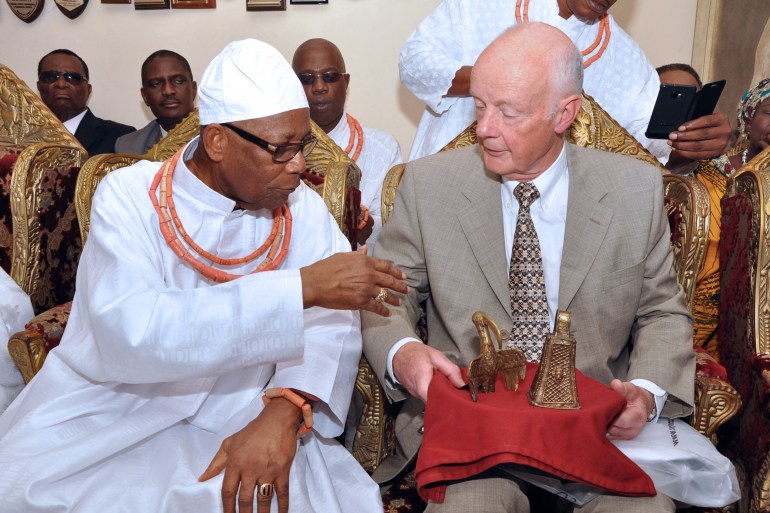
With Awoyemi and Dunstone’s assistance, Walker travelled to Nigeria, formally returning the sculptures to the Oba (king) of Benin.
At least 3,000 other bronzes – and perhaps many more – remain scattered around the world, adorning the walls of Western museums, or gathering dust in private collections.
Despite years of campaigning, very few have made their way back to Benin City.
That could be about to change, with a fresh Western push to return what was stolen, fuelled in part by the decolonisation movement.
Last month, the University of Aberdeen became the first UK institution in decades to agree to the unconditional return of a plundered bronze, while officials in Germany are negotiating the full restitution of over 500 Benin objects.
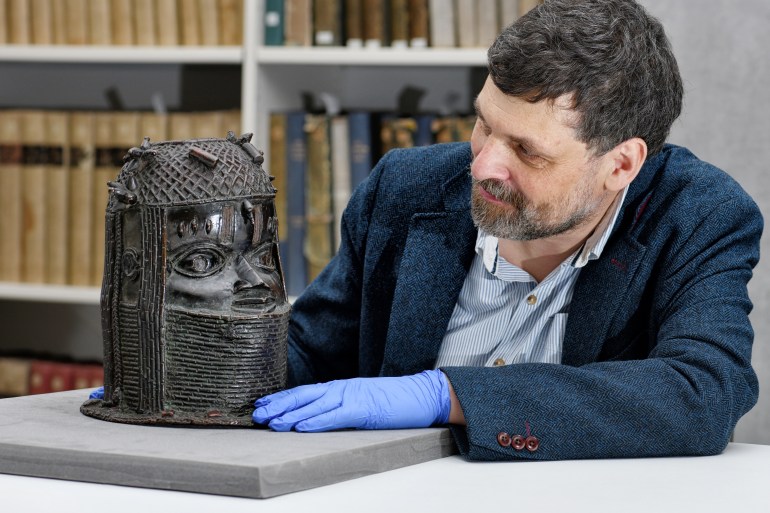
The National Museum of Ireland is also working towards the return of stolen artefacts.
The Church of England, which did not participate in the looting but was gifted two bronze busts in 1982, has also signalled it would repatriate them.
Though taken with a pinch of salt, such announcements are welcome in Nigeria, according to artist and historian Peju Layiwola.
For years, she has used her artwork to raise awareness of the bronzes, believing them to be irrefutable evidence of Benin City’s precolonial sophistication.
“You can tell by looking at the metalwork that it was a very developed civilisation, as it still is,” said Layiwola, a descendent of the Benin royal family.
“The artists weren’t only skilled in their sculpting of the metal, but also in their understanding of aesthetics, in their ability to imbue cultural meanings; meanings that remain relevant today.”
Despite their deep cultural resonance, few modern-day Nigerians have seen a plundered bronze in person — the vast majority being stored overseas.
This, Layiwola says, deprives them of agency over their own history, hindering efforts to come to terms with an ugly colonial past.
“We were told that our culture was vulgar, that our religion was fetish, that we were pagans. So we must have some kind of reorientation, a new way of seeing African culture as a total culture — not one defined by others. Getting the bronzes back is key to that.”
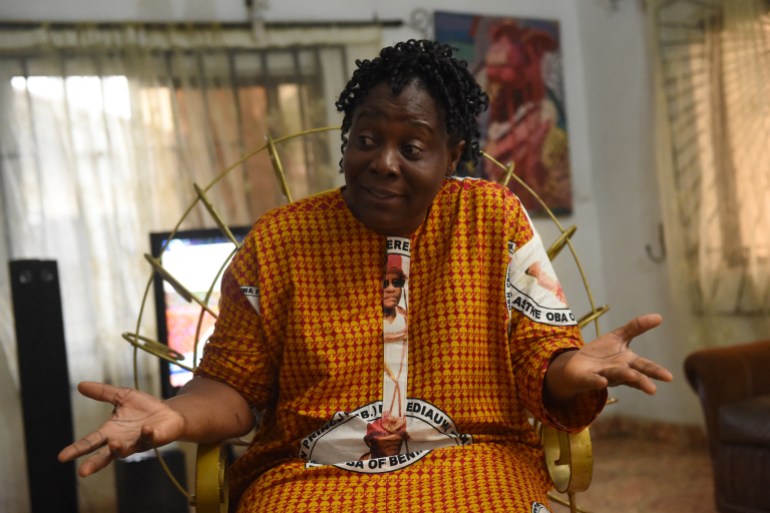
The Nigerian government shares her enthusiasm.
In 2010, it helped create the Benin Dialogue Group: a team of African and Western stakeholders tasked with the artefacts’ return. Though progress has been slow, plans are now in motion for the world’s “most comprehensive display” to be established in Benin City.
From 2023, locals will be able to bask in the beauty of their ancestors’ bronze work, centrepieces of the new Edo Museum of West African Art (EMOWAA).
The objects will be supplied by their current European custodians, initially on loan for three years, with the possibility to renew.
This caveat is a source of great anger for many Nigerians, said Awoyemi.
“They say they understand that the bronzes have present-day significance. Why then, should they only be provided on loan?”
It is a question directed largely at London’s British Museum, which holds more than 900 Benin objects — the world’s largest collection.
In a statement, the organisation said it “fully acknowledged” the devastation of the 1897 attack, and was working with the EMOWAA to “develop a new permanent display of Benin works of art.”
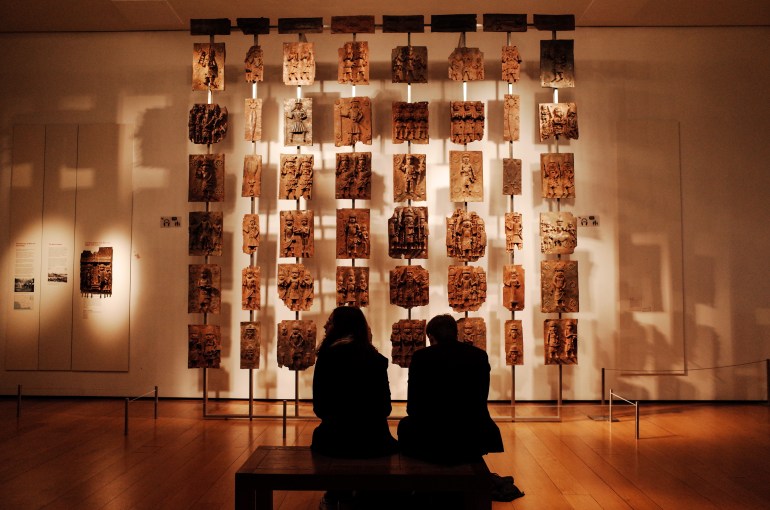
There is, however, little chance of full restitution any time soon.
The British Museum is legally prohibited from disposing of artefacts, a rule UK lawmakers would have to change before an unconditional return could be sanctioned.
That has happened in the past, experts note, and could again in the future.
“We’ve changed the law for other cases, be that in the very different historical circumstances of Holocaust spoliation, or with ancestral human remains for Indigenous people,” explained professor Dan Hicks, curator of world archaeology at Oxford University’s Pitt Rivers Museum and author of The Brutish Museums.
“How long can we say, just on principle, that we’re going to leave African heritage out?”
There is another dimension to consider: money.
For decades, Western institutions have benefitted financially from their Benin collections, drawing visitors by the thousands.
Meanwhile, said Awoyemi, the artists’ descendants are living in poverty.
“There are parts of the local community that are really suffering. People who are too poor to take care of their children, families that find it very difficult to eat.”
That is why, with retirement approaching, the policeman’s mind is on a new campaign — one focused not only on the restitution of artwork, but reparations as well.
“The local community needs both,” he said. “Only then will the wounds of 1897 begin to heal.”
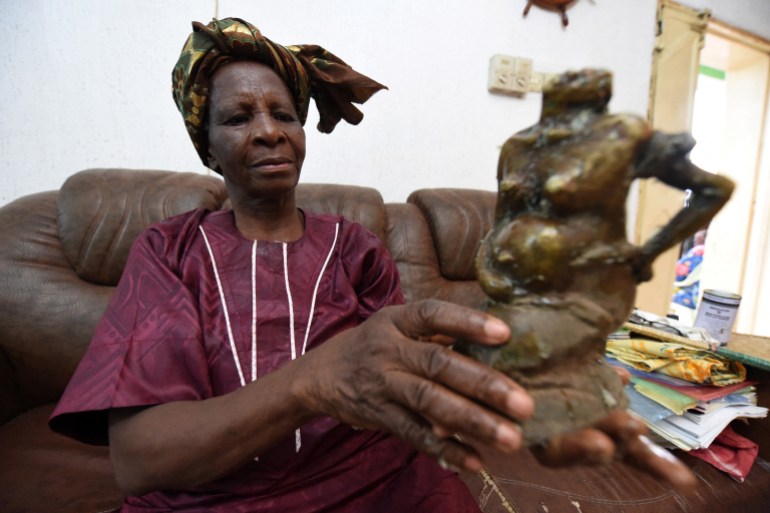
Source: Al Jazeera













